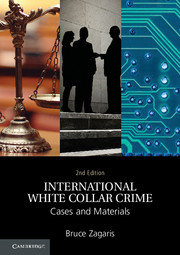Book contents
- Frontmatter
- Contents
- Preface
- 1 Introduction
- 2 Taxation
- 3 Money Laundering and Counterterrrorism Financial Enforcement
- 4 Transnational Corruption
- 5 Transnational Organized Crime
- 6 Export Control and Economic Sanctions
- 7 International Environmental Crimes
- 8 International Securities Enforcement
- 9 Extraterritorial Jurisdiction
- 10 International Evidence Gathering
- 11 Extradition and Alternatives
- 12 International Prisoner Transfer
- 13 The United Nations
- 14 The World Bank Group
- 15 INTERPOL
- 16 Economic Integration and Business Crimes
- Index
- References
10 - International Evidence Gathering
Published online by Cambridge University Press: 05 November 2015
- Frontmatter
- Contents
- Preface
- 1 Introduction
- 2 Taxation
- 3 Money Laundering and Counterterrrorism Financial Enforcement
- 4 Transnational Corruption
- 5 Transnational Organized Crime
- 6 Export Control and Economic Sanctions
- 7 International Environmental Crimes
- 8 International Securities Enforcement
- 9 Extraterritorial Jurisdiction
- 10 International Evidence Gathering
- 11 Extradition and Alternatives
- 12 International Prisoner Transfer
- 13 The United Nations
- 14 The World Bank Group
- 15 INTERPOL
- 16 Economic Integration and Business Crimes
- Index
- References
Summary
A Hypothetical
Over the last five years, Joseph Borodillo (JB) has developed a successful financial empire, which in recent months has gained “high tech” capabilities. In particular, it has expanded from waste disposal and restaurants and night clubs to counterfeit computer software.
As part of his business enterprises, JB has established a company called SW Ltd. (SW) in Country ABC to import and distribute counterfeit software in the United States. SW buys counterfeit software from CopyIT, a small company in the Commonwealth of Lavadoria. Instead of paying CopyIT for the counterfeit software directly, SW buys computer hardware for the company.
The SW-CopyIT scheme operates as follows:
1. JB sells the counterfeit software and transfers the proceeds to offshore accounts.
2. JB then has SW use its existing account with Grande Verde in Lavadoria to order large quantities of computer equipment.
3. Grande Verde Lavadoria is a wholly owned subsidiary of Grande Verde, a large corporation and major government contractor. Grande Verde actually fills the contract order and receives copies of the purchase order.
4. JB pays Grande Verde for the computer equipment with cashier's checks drawn on several offshore banks. Some, but not all, Grande Verde executives are knowingly involved in these schemes.
5. Grande Verde ships the computer equipment to CopyIT's offices in Lavadoria.
JB pays for counterfeit software imports with the proceeds of the sale of a U.S. company, using money from suspicious sources shipped to a third party in suspicious amounts. In essence, the payments suggest the use of the Black Market Peso Exchange.
Jane Laing, Grande Verde's compliance counsel, reports her concerns about the sales in Lavadoria to Mike Smith, Grande Verde's outside counsel. Mike then decides to make a voluntary disclosure to the U.S. Attorney's Office.
To what extent can Grande Verde cooperate with the government? Can it make anyone available for interviews? Can it turn over records? Can it waive financial privacy rights for its bank accounts?
From the perspective of the U.S. government and the U.S. Attorney's Office, what is the best way to proceed? Can they obtain documents from Grande Verde and CopyIT? Can the U.S. Attorney issue subpoenas to Grande Verde for its records? What if Lavadoria has a blocking statute? What are the effects of bank secrecy? Are there any dual criminality issues?
- Type
- Chapter
- Information
- International White Collar CrimeCases and Materials, pp. 365 - 412Publisher: Cambridge University PressPrint publication year: 2015

